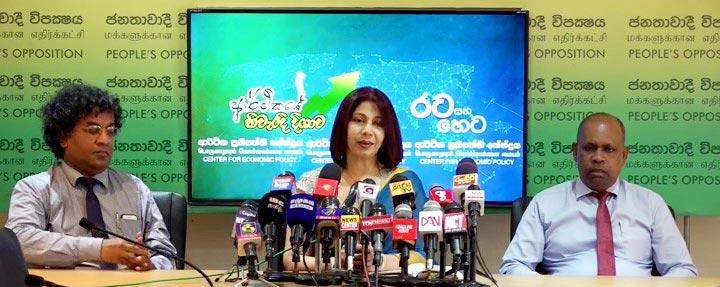Sunday Feb 22, 2026
Sunday Feb 22, 2026
Thursday, 29 February 2024 04:15 - - {{hitsCtrl.values.hits}}


The country’s Micro, Small and Medium Enterprises (MSMEs) yesterday hailed the Government’s decision to temporarily halt the draconian parate law action until 15 December 2024.
The MSME Chamber of Sri Lanka and formerly the Anti-Parate Business Forum yesterday expressed gratitude to all stakeholders for their collective efforts in securing a temporary suspension of parate executions, providing much-needed relief to micro, small and medium enterprises (MSMEs) grappling with financial challenges.
Holding a special media briefing at the Justice, Prison Affairs, and Constitutional Reform Ministry to raise awareness about the temporary suspension of the implementation of the parate law and the upcoming amendments to the legislation, anti-parate activist S.M. Raghavan highlighted the significance of the temporary suspension as a crucial achievement for its associates, offering much needed breathing space and addressing the root cause of their struggles.
Raghavan extended gratitude to the Government, Opposition, President’s advisers, media, international, and national organisations for their unwavering support in securing the temporary suspension.
He singled out Justice, Prison Affairs and Constitutional Reform Minister Dr. Wijeyadasa Rajapakshe and Industries Minister Dr. Ramesh Pathirana for their instrumental roles in the collective effort.
“A special thanks must go to Minister Dr. Rajapakshe for delivering his promise made to the anti-parate group held 65 days ago at our conference held at the BMICH. He was instrumental in understanding and helping to convince the authorities to address the issues faced by the MSMEs. We hope the Justice Minister will continue to help our group in ironing out the problems involving the law and to bring in necessary amendments to the parate law,” he added.
He described how the activists collectively built a strong opinion that led to the Government’s decision and reiterated their gratitude for all the efforts made by various stakeholders.
Raghavan also said as a collective move, they have done their level best to help the voiceless MSMEs that were battered by the multiple crises post-COVID.
“The temporary suspension is a very good step towards addressing the root cause of this archaic law. As members of the anti-parate group, we must now make the maximum of this given opportunity to overcome the challenges,” he added.
On Tuesday MSME Chamber of Sri Lanka the Sri Lanka United National Businesses Alliance (SLUNBA) expressed gratitude to Opposition Leader Sajith Premadasa for advocating on behalf of MSMEs affected by the parate law and championing their cause in Parliament.
Addressing a media conference held at the Opposition Leader’s office on Tuesday, the members of its alliance along with SLUNBA President Tania Abeysundara and Susantha Liyanarachchi highlighted the key role of Premadasa in raising awareness about the plight of MSMEs.
“We commended the Opposition leader for initiating a debate on corrupt transactions under the parate law, shedding light on the challenges faced by the business community,” Abeysundara added.
Reflecting on the broader implications of the temporary suspension, she cited the importance of recognising the vital contributions of MSMEs to the country’s economy.
“The parate law was specifically enacted for the two State-owned banks with the intention of preventing arbitrary lending practices. Its purpose was to safeguard the state banks and ensure responsible lending, rather than burdening the people of the country. If the Governor of the Central Bank believes he can make arbitrary decisions that negatively impact small and medium-scale entrepreneurs, he is mistaken. In 2019, approximately Rs. 87 billion was subject to the parate law, but today, due to decisions made by the Central Bank Governor, this figure has skyrocketed to 2 trillion. It is unprecedented for entrepreneurs to be required to provide extensive documentation and business information when applying for loans. Such stringent requirements are not customary in any other country,” she explained.
Abeysundara underscored the need for regulatory measures that prioritise the interests of MSMEs, cautioning against arbitrary decisions that could undermine their viability.
Liyanarachchi highlighted the economic toll of the parate law, underscoring the adverse impact on industrial production and the overall GDP contraction.
He criticised the Central Bank Governor for failing to grasp the gravity of the situation, leading to prolonged struggles for MSMEs.
“On 14 September 2023, the International Monetary Fund (IMF) advised Central Bank’s independence. As a result, the Parliament granted significant authority to the Central Bank Governor. Using this newfound power, the Governor amended the parate law, which subsequently had detrimental effects on businesses when combined with the collaboration between the Central Bank and commercial banks. Despite the fact that small and medium-sized enterprises (SMEs) contribute 52% percent to the GDP of a country, this aspect seemed to be overlooked by the Central Bank Governor. Consequently, many SMEs suffered financial hardships and collapsed,” he claimed.
Liyanarachchi also said the banks have indicated their intent to pass on additional risks to their customers in the future due to the amendments made by the Central Bank Governor. Additionally, the suspension of the parate law has not granted banks the regulatory authority to adjust interest rates for their customers.
“We are grateful to the Opposition leader for consistently advocating for SMEs whenever discussions regarding the parate law arose. His efforts included addressing Parliament on behalf of SMEs, initiating a debate regarding corrupt transactions under the Parate Act and ultimately contributing significantly to the empowerment of the country’s businessmen,” he added.